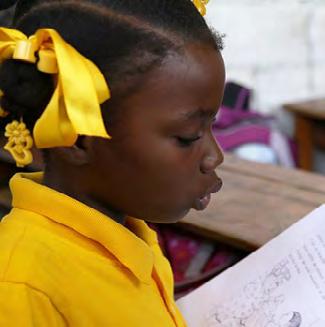
2 minute read
ON
from Count me in
by WBGEducation
Educational Quality and Support for Girls

Advertisement
In Haiti, the projects Providing an Education of Quality in Haiti and Providing an Education For All Haiti (EFA) support quality girls’ education. Project activities promote awareness of gender-based violence (GBV) and harmful stereotypes toward girls. A safer space will be created to learn life skills, and to improve safety and security among girls. Activities include gender clubs for school beneficiaries, gender-sensitive rehabilitation of bathroom facilities, and in-service training of school directors and teachers. Ultimately, these interventions will lower the likelihood that girls miss school and increase their chance to successfully transition to secondary education.
Eleven year old Jessica Prudent lives in Port-Au-Prince. She went to a school in Carrefour, one of the poorest neighborhoods of the capital. She benefited from the Tuition Waiver Program for six years, allowing her to attend school for free. In Haiti, parents have to pay on average $130 each year to send their children to school, leaving more than 200,000 children who cannot pay, out of school.
Over 170,000 girls have so far been impacted through the project.
On average, children start school two years late, as was the case for Jessica’s older sister. Her mom says, “The first one did not enter school early. She is 21 years old and in her final year of secondary school.”
Jessica adds, “The Program EFA helped me pursue my studies. If I didn’t have it, I don’t know where I would be at this time.”
Improving Learning Outcomes in Chad
The new Improving Learning Outcomes Project in Chad will focus on improving girls’ education and learning in the classroom. The $150 million grant will include providing reading materials that are sensitive to gender-representation (including positive role models for girls in school and avoiding gender biases). In addition to this, the project will also conduct community awareness campaigns to combat gender stereotypes, and emphasize the importance of girls’ schooling, in a drive to increase girls’ attendance and enrollment at school. Further seeking to improve the learning and school environments for girls, the project will create gender-separate toilets and WASH facilities in almost 500 schools. In addition, the project will incentivize the participation of women in the teaching force through the integration of female community teachers into the civil service, as it increases girls’ school attendance. Read More
Read More
Partnerships Equal Greater Impact
Partnerships both within and outside of the World Bank are critical to the Education Global Practice’s (GP) work on girls’ education. The Education GP works with other global practices in the Bank to improve girls’ education—for example, collaborating with the Water GP for access to sanitation and hygiene in schools, with Social Protection and Jobs GP for challenges related to labor market transition, or Energy GP to improve school safety.
The World Bank collaborates actively with many donors and organizations. As a signatory to the G7 Charlevoix Commitment, the Bank has already exceeded its pledge of $2 billion from 2018 to 2023 to girls’ education in FCV countries. The Education GP is also: o collaborating with the Foreign, Commonwealth & Development Office FCDO (UK) about targets and high-level engagement with G7 donors, to support aid and financial commitment for girls’ education; o signatory to the Freetown Manifesto, led by the United Nations Girls Education Initiative (UNGEI), to build momentum for gender equality in and through education; o collaborating with UNICEF, UNESCO, GPE, and other partners on furthering advocacy on girls’ education, for example through several events held at the Transforming Education Summit during the United Nations General Assembly in September 2022; o a member of the Inter-agency Network for Education in Emergencies (INEE) Girls’ EiE Reference Group, which seeks to further research and advocacy for girls’ education in emergencies; o working closely with the Global Partnership for Education (GPE) as the implementing agency for 55 percent of the total GPE grants of $3.60 billion, that also support girls’ education.





